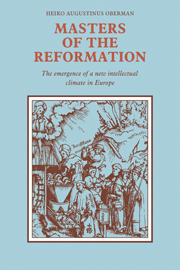Book contents
Preface
Published online by Cambridge University Press: 07 October 2011
Summary
O, stulti, O Sautheologen …!
Martin Luther, Romans Commentary (WA 56, p. 274, line 14), Wittenberg 1515Vous ne ferez rien de durable pour le bonheur des hommes parce que vous n'avez aucune idée de leur malheur … l'essence de notre malheur est surnaturelle.
Georges Bernanos, Les grands cimetières sous la lune, Paris 1938Though a conceptual unity in itself, this work is the companion volume to The Harvest of Medieval Theology, published in 1963 in that other, latter-day Cambridge graced by Harvard University. There, based in the late fifteenth century, I looked back over the medieval heritage invaded by changing perceptions, new scientific discoveries and political conflicts. Now I have turned around to reconnoitre a terrain crisscrossed by late medieval expectations, theological moral optimism and social critique, the sixteenth-century Reformation's lines of advance.
As the title suggests, the significance of academic tradition will be granted its full weight. Nevertheless, a religious movement originating in one of the youngest German universities, Wittenberg, would never have achieved the social relevance, the political power, the permanence it did in fact achieve had not many of its ‘masters’ been self-made men who proved themselves charismatic leaders in the marketplace and in the city council.
From the very outset this division between the rarefied and the practical lent to the Reformation movement a kind of antiphonal complexity far beyond that suggested by the colourful medieval clashes between ‘town’ and ‘gown’.
- Type
- Chapter
- Information
- Masters of the ReformationThe Emergence of a New Intellectual Climate in Europe, pp. ix - xPublisher: Cambridge University PressPrint publication year: 1981



